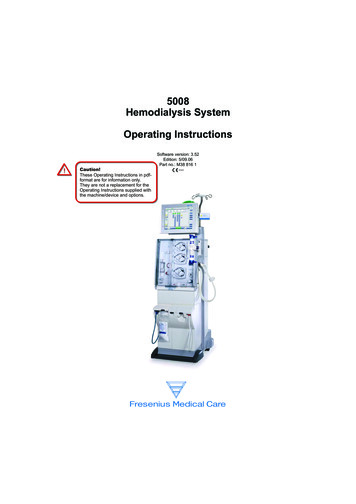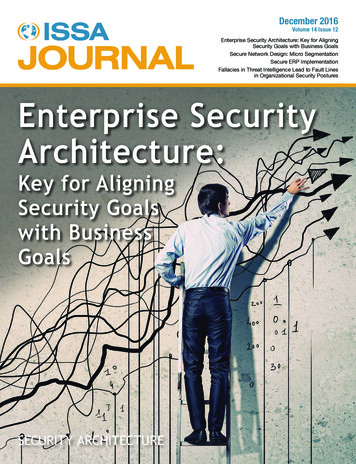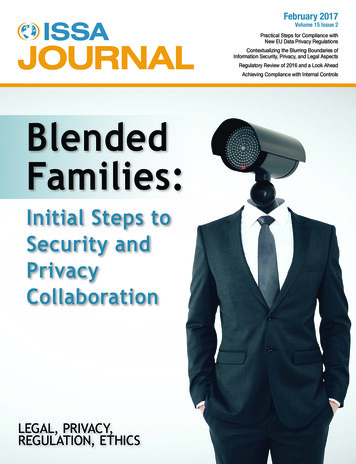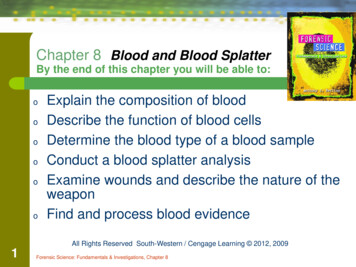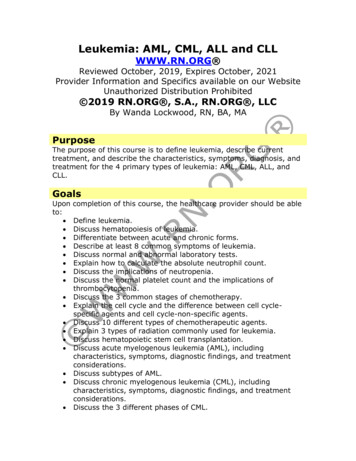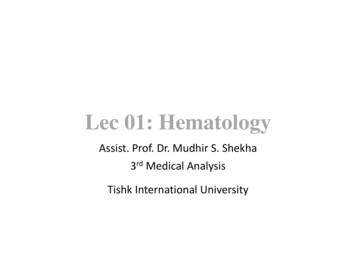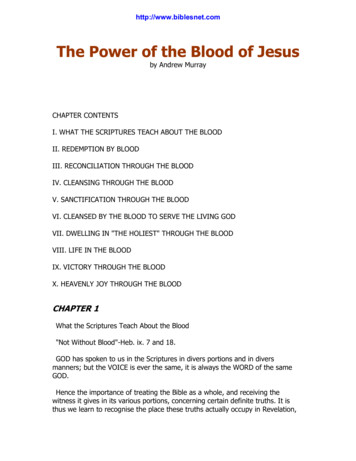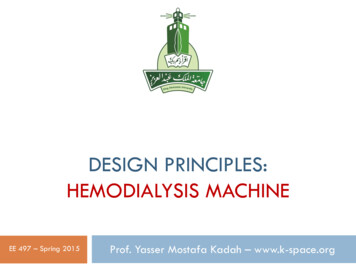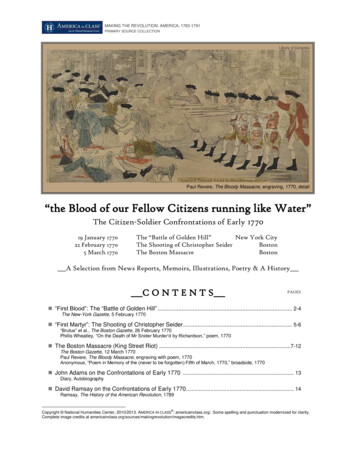
Transcription
MAKING THE REVOLUTION: AMERICA, 1763-1791PRIMARY SOURCE COLLECTIONLibrary of CongressPaul Revere, The Bloody Massacre, engraving, 1770, detail“the Blood of our Fellow Citizens running like Water”The Citizen-Soldier Confrontations of Early 177019 January 177022 February 17705 March 1770The “Battle of Golden Hill”New York CityThe Shooting of Christopher SeiderBostonThe Boston MassacreBostonA Selection from News Reports, Memoirs, Illustrations, Poetry & A History*C O N T E N T SPAGES “First Blood”: The “Battle of Golden Hill” . 2-4The New-York Gazette, 5 February 1770 “First Martyr”: The Shooting of Christopher Seider . 5-6“Brutus” et al., The Boston Gazette, 26 February 1770Phillis Wheatley, “On the Death of Mr Snider Murder’d by Richardson,” poem, 1770 The Boston Massacre (King Street Riot) .7-12The Boston Gazette, 12 March 1770Paul Revere, The Bloody Massacre, engraving with poem, 1770Anonymous, “Poem in Memory of the (never to be forgotten) Fifth of March, 1770,” broadside, 1770 John Adams on the Confrontations of Early 1770 . 13Diary, Autobiography David Ramsay on the Confrontations of Early 1770 . 14Ramsay, The History of the American Revolution, 1789*Copyright National Humanities Center, 2010/2013. AMERICA IN CLASS : americainclass.org/. Some spelling and punctuation modernized for clarity.Complete image credits at redits.htm.
“FIRST BLOOD”: THE BATTLE OF GOLDEN HILLNEW YORK CITY, JANUARY 19, 1770Because the Golden Hill confrontation between colonists and British soldiers is the first in which serious injuries were incurred, it isoften called the “first blood” incident of the Revolution. New Yorkers battled with troops attempting to cut down the Liberty Pole onGolden Hill (in present-day downtown Manhattan) three previous poles having been destroyed by British troops since 1766.The New-York Gazette, 5 February 1770N Saturday Night the 13th Instant [of thismonth], about eight o’Clock, a Party of Soldiers, near forty in Number, began to execute aDesign [plan] they had formed to cut down theLiberty Pole. To effect this with the greater Safety,they placed Sentinels in the different Roads that leadto it and the most public Places to discover any Number of the Inhabitants that should be making towardsthe Pole to obstruct them. In this Situation they werediscovered sawing the Spurs by some Persons thatwere crossing the Fields, who went into Mr. Montanye’s and reported it to sundry [several] Persons in theHouse . . . Captain White was attacked near theHouse by a Soldier who drew his Bayonet on himand threatened to take his Life if he alarmed [warned]the Citizens, upon which the Soldier returned to hisCompanions at the Pole. The People at Mr. Montanye’s came out and called out Fire in order to alarmthe Inhabitants. Soon after a Fire was seen at thePole, which proved to be a Fuse that the Soldiers hadput in it in order to communicate Fire to a Cavitywhich they had made in the Pole and filled with Powder, with a Design to split it. The Fuse did not communicate [start] the Fire, nor do the Execution thatwas expected, which the People at Mr. Montanye’sobserving, hissed at the Soldiers, and as the formerhad but just before called out Fire, the latter considered it as a Taunt on their abortive [failed] Labor.These Sons of Mars [British soldiers] could notbrook [tolerate] the least Sign of Satisfaction in theCitizens at their heroic Attack on a Pole’s provingunsuccessful. No, they, unprovoked, determined on amore heroic Action, which was to storm Mr. Montanye’s House, and accordingly entered it with drawnSwords and Bayonets, insulted the Company and beatthe Waiter. Not satisfied with this mal-Treatment,they proceeded to destroy every Thing they couldconveniently come at. They broke Eighty-four Panesof Glass, two Lamps and two Bowls, after which theyquitted the House with Precipitation [haste] lest anyof them should be discovered.OAfter a British officer sent a guard to the pole, no furtherviolence occurred that night. Three days later, however,British soldiers succeeded in exploding the pole and placingits remnants at the door of Mr. Montanye. Tensions escalated until Friday, the 19th, when two “Sons of Liberty”attempted to stop British troops who were posting a handbillaround the city.The Soldiers, still bent on further Insults to theCitizens, on Friday the 19th published the followingPaper and went in Posses through the Streets, puttingthem up at the most public Places of the City, andthrew some of them into the Mayor’s Entry.God and a Soldier all men doth adoreIn Time of War, and not before:When the War is over, and all Things righted,God is forgotten, and the Soldier slighted.WHEREAS an uncommon and riotous disturbanceprevails throughout this city by some of its inhabitants, who style themselves the S s of L y,but rather may more properly be called real enemiesto society, and whereas the army, now quartered inNew York, are represented in a heinous light to theirofficers and other, for having propagated a disturbance in this city by attempting to destroy their LibertyPole in the Fields, which, being now complete,without the assistance of the army, we have reason tolaugh at them and beg the public only to observe howchagrin’d those pretended S s of L y lookas they pass through the streets, especially as thesegreat heroes thought their freedom depended on apiece of wood . . . .[It] is well known since their [troops’] arrival inNew York they have watched night and day for thesafety and protection of the city and its inhabitants;[they] have suffered the rays of the scorching sun insummer and the severe colds of freezing snowy nightsin winter, which must be the case, and fifty timesworse had there been a war, which we sincerely prayfor in hopes those S s of L y may feel theeffects of it, with famine and destruction pouring ontheir heads. . . .[A]ddressed to the public for which,may the shame they mean to brand our names with,stick on theirs. Signed by the 16th Regiment of Foot[Infantry]Mr. Isaac Sears and Mr. Walter Quackenbos,seeing six or several Soldiers going towards the FlyMarket, concluded they were going to it to put upsome of the above Papers [handbills]. Mr. Searsseized the Soldier that was fixing the Paper by theCollar and asked him what Business he had to put upLibels against the Inhabitants? and that he wouldcarry him before the Mayor. Mr. Quackenbos tookNational Humanities Center The Citizen-Soldier Confrontations of Early 17702
hold of one that had the Papers on his Arm. A Soldierstanding to the Right of Mr. Sears drew his Bayonet,upon which the latter took a Ram’s Horn and threw itat the former, which struck him in the Head, and thenthe Soldiers, except the two that were seized, madeoff and alarmed others in the Barracks. They immediately carried the two to the Mayor and assigned himthe Reason of their bringing them before him. TheMayor sent for Alderman Desbrosses to consult onwhat would be proper to be done in the Matter.In the mean Time, a considerable Number ofPeople collected opposite to the Mayor’s. Shortlyafter, about twenty Soldiers with Cutlasses andBayonets from the lower Barracks made theirAppearance, coming to the Mayor’s through the mainStreet. When they came opposite to Mr. Peter Remsen’s, he endeavored to dissuade them from goingany further (supposing they were going to theMayor’s) representing to them that they would getinto a Scrape, but his Advice was not taken, owing,as he supposes, to one of two of their Leaders whoseemed to be intoxicated.The People collected at the Mayor’s determined tolet them pass by peaceably and unmolested, andopened for them to go through. Captain Richardsonand some of the Citizens, judging they intended totake the two Soldiers from the Mayor’s by force,went to his Door to prevent it. When the Soldierscame opposite to his House, they halted. Many ofthem drew their Swords and Bayonets; some say theyall drew. But all that were present agree that manydid, and faced about to the Door and demanded theSoldiers in Custody. Some of them attempted to getinto the House to rescue them. Capt. Richardson andothers at the Door prevented them, and desired themto put up their Arms and go to their Barracks, that theSoldiers were before the Mayor who would do themJustice. The Soldiers within likewise desired them togo away to their Barracks and leave them to theDetermination of the Mayor.Upon the Soldiers drawing their Arms, many ofthe Inhabitants, conceiving themselves in Danger, ranto some Sleighs that were near and pulled out someof the Rungs. The Mayor and Alderman Desbrossescame out and ordered the Soldiers to their Barracks.After some Time, they moved up the Fly. The Peoplewere apprehensive that, as the Soldiers had drawntheir Swords at the Mayor’s House and therebycondemned the Civic Authority and declared Waragainst the Inhabitants, it was not safe to let them gothrough the Streets alone lest they might offerViolence to some of the Citizens: To prevent whichthey followed them and two Magistrates aforesaid tothe Corner of Golden Hill, and in their going, severalof the [obscured] reasoned with them on the Folly oftheir drawing [obscured] Swords, and endeavored topersuade them to sheath them, assuring them noMischief was intended them, [obscured] withoutSuccess.They turned up Golden Hill and about the Timethey gained the Summit, a considerable Number ofSoldiers joined them, which inspired them to reinsultthe Magistrates and exasperate the Inhabitants, whichwas soon manifested by their facing about, and one inSilk Stockings and neat Buckskin Breeched (who issuspected to have been an Officer in Disguise) givingthe Word of Command, “Soldiers draw yourBayonets and cut your Way through them.” Theformer was immediately obeyed, and they called out,“Where are your Sons of Liberty now?” and fell onthe Citizens with great Violence, cutting andslashing. This convinced them that their Apprehensions were well founded, for although no Insult orViolence had been offered to the former, yet insteadof going peaceably to their Barracks, as they wereordered by the Magistrates, they in Defiance of theirAuthority (Veteran-like) drew their Arms to attackMen who, except six or seven that had Clubs andSticks, were naked [unarmed]. These few that had theSticks maintained their Ground in the narrow Passagein which they stood and defended their defenselessFellow Citizens for some Time against the furiousand unmanly Attacks of armed Soldiers, until one ofthem missing his Aim, in a Stroke made at one of theAssailants, lost his Stick, which obliged the former toretreat to look for some Instrument of Defense. TheSoldiers pursued him down to the main Street. One ofthem made a Stroke with a Cutlass at Mr. FrancisField, one of the People called Quakers, standing inan inoffensive Posture in Mr. Field’s Door, at theCorner, and cut him on the Right Cheek, and if theCorner had not broke the Stroke, it would haveprobably killed him. This Party that came down tothe main Street cut a Tea-Water Man driving hisCart, and a Fisherman’s Finger. In short, they madlyattacked every Person that they could reach, and theirCompanions on Golden Hill were more inhuman, for,besides cutting a Sailor’s Head and Finger [who] wasdefending himself against them, they stabbed anotherwith a Bayonet, going about his Business, so badlythat his Life was thought in Danger.Not satisfied with all this Cruelty, two of themfollowed a Boy going for Sugar into Mr. Elsworth’sHouse. One of them cut him on the Head with aCutlass, and the other made a Lunge with a Bayonetat the Woman in the Entry, that answered the Child.Capt. Richardson was violently attacked by two ofthe Soldiers with Swords, and expected to have beencut to pieces but was so fortunate as to defendhimself with a Stick for a considerable Time ’till aHalbert was put into his hands, with which he couldhave killed several of them, but he made no other UseNational Humanities Center The Citizen-Soldier Confrontations of Early 17703
of it than to defend himself and his naked FellowCitizens. . . .From all which I think it is evident that theInhabitants only acted on the Defensive. Capt.Richardson was a Witness of all that passed, from theSoldiers coming to the Mayor’s Door, and declaresthat if they had not halted and acted as they did onGolden Hill, he verily believes there would not havebeen any Mischief done.Some Time after the Commencement of the grandAffray on the Golden Hill, a Posse of Soldiers camedown from another Quarter, opposite to the Streetthat leads down from the Hill, and called out to theSoldiers on the Hill “to cut their Way down, and theywould meet them half Way.” During the Action onthe Hill, a small Party of Soldiers came along the Flyby the Market and halted near Mr. Norwood’s. Someof the Inhabitants gathered round them when aConversation ensued on the then Disturbances. Soonafter, the former drew their Bayonets, upon which, asthe Citizens were all unarmed, they cast about to lookfor Stones or some Instruments to defend themselves;but the Soldiers observing that they could not findany Thing, one of them made an Attempt to stab Mr.John White who, finding himself in imminentDanger, judged it most safe to take Flight toward theMayor’s. The Soldier pursued him with his drawnBayonet and made several Attempts when he thoughtMr. White within his reach to stab him, but incrossing the Gutter the Soldier fell, which gave thedesigned Victim an opportunity to escape or, in theOpinion of all present, he would certainly have fallena Sacrifice to the unprovoked, malevolent andmerciless Rage of his Pursuer. Several of the Soldiersthat were on the Hill were much bruised, and one ofthem badly cut. Soon after the above Attack, many ofthe Magistrates collected from different Quarters ofthe City, and several of the Officers being madeacquainted with the Affray, came to the Places ofAction and dispersed the Soldiers.Thus ended a Riot which would have beenproductive of much worse Consequences had theCitizens been armed. In the Evening the Soldiers cutone Lamp Lighter on the Head and drew the Ladderfrom under another while he was lighting the Lamps.On Saturday the Twentieth, a Soldier made anAttempt to stab a Woman coming from Market with aBundle of Fish, run his Bayonet through her Cloakand Body Clothes. About Noon, at the Head ofChapel Street an Affray began between some Sailorsand Soldiers, the Origin of which I have not beenable with certainty to find out. . . .The Mayor, giving over all hopes of quelling theRiot, had moved off from the Place of Action in orderto bring the Officers out, but some of the Citizensrequested him not to quit the Fields and leave theSoldiers with their Arms to destroy the Inhabitants,upon which he returned, and soon after a great Bodyof People was coming up the Broad-Way which, theSoldiers seeing, they went off to their Barracks.A Report being spread through the City that theSoldiers had rushed out of their Barracks and wereslaughtering the Inhabitants in the Fields soonbrought out a great Number of the Citizens to theNew Gaol [jail]. While they were inquiring into theCause of the Riot, a Number of Soldiers, not morethan Twenty, came up from the lower Barracks andmarched through a considerable Body of theInhabitants collected along the Street (to the South ofthe Presbyterian Meeting) that leads to the Gaol,when they might very easily have avoided them andtaken a Route to the Barracks across the Fields,where none of the Citizens stood, which would nothave endangered or exposed them to a Riot, if theywere not disposed to it. The People there opened andlet them pass. When they got near through, a greaterBody standing to the Southward of the Gaol Fence,one of the Soldiers, in the Presence of a veryreputable Person, snatched a Stick from one of theBystanders; others say that a Sword was taken fromanother. This brought on anew Affray which lastedabout two Minutes, cutting and slashing on bothSides when, the Soldiers finding themselves roughlyhandled, they made the best of their Way to theBarracks, and some of the Inhabitants pursued themto the Gates, and one of them took a bayonet from aSoldier. In this Scuffle, one of the Citizens waswounded in the Face and had two of his Teeth brokeby a Stroke of a Bayonet. A Soldier received a badCut on the Shoulder. These are the principal Woundsthat the Combatants sustained. . . .To conclude, it’s evident that there has beenBlood spilt on both Sides. I therefore submit it to mySuperiors whether the Reputation of the Citizens orof the Soldiers can be incontestably vindicated, andindubitable Information thereof given to theGovernment at Home, unless there is a general legalInquiry into the Whole of these Disturbances. TheInhabitants that were active are desirous that such anExamination should be made, and, as there aresufficient Mediums of Proof to begin it, if it is notdone, the World will be at no Loss to what Cause toattribute the Neglect of it, and where all this Mischieffirst originated.Jan. 31, 1770AN IMPARTIAL CITIZEN.National Humanities Center The Citizen-Soldier Confrontations of Early 17704
“FIRST MARTYR”: THE SHOOTING OF CHRISTOPHER SEIDERBOSTON, FEBRUARY 22, 1770Shot and killed by an American customs official after picketing the store of a merchant who refused to boycott British goods, elevenyear-old Christopher Seider became an instant martyr and a symbol of resistance to tyranny. His funeral was attended by hundreds.The Boston Gazette, 26 February 1770On Thursday last in the Forenoon a barbarousMurder attended with many aggravating Circumstances as committed on the Body of a young Lad ofabout eleven Years of Age, Son to Mr. Snider1 of this Town. A Number of Boys had beendiverting themselves with the Exhibition of a Piece ofPageantry near the House of Theophilus Lillie,2 whoperhaps, at this Juncture of Affairs, may with themost Propriety be describ’d by the Name of anIMPORTER This Exhibition naturally occasion’dNumbers to assemble, and in a very little Time therewas a great Concourse of Persons, especially theyounger Sort. One Ebenezer Richardson, who has been for manyYears employ’d as an under Officer of the Customs,long known by the name of an INFORMER, andconsequently a Person of a most abandon’d Character,it seems, took Umbrage at the suppos’d Indignityoffer’d to the Importers, and soon became a party inthe Affair He first attempted to demolish thePageantry, and failing in the Attempt he retired to hisHouse which was but a few Rods from the Exhibition.Several Persons passing by the House, Richardson,who seem’d to be determin’d to take this occasion tomake a Disturbance, without the least Provocationgave them the most opprobrious Language, chargingthem with Perjury, &c. which rais’d a Dispute betweenthem. This, it is suppos’d, occasion’d the Boys togather nearer Richardson’s House, and he, thinking hehad now a good Coloring [opportunity] to perpetratethe Villainy, threatened to fire upon them and sworeby GOD that he would make the Place too hot forsome of them before Night, and that he would make aLane through them if they did not go away. Soon after,a Number of Brickbats or Stones were thrown amongthe People from Richardson’s House, but theWitnesses, who were sworn before the Magistrates,declared that it did not appear to them that, till then,any Sort of Attack was made by the People on theHouse. This, however, brought on a Skirmish, andRichardson, discharg’d his Piece [fired his weapon]loaden with Swan Shot at the Multitude, by which theunhappy young person above-mentioned was mortallyhaving since died of his Wounds.A Youth, Son to Capt. John Gore, was alsowounded in one of his Hands and in both his Thighs,by which his Life was endanger’d, but he is likelysoon to recover of his Wound. . . .As soon as they [Richardson et al.] could be taken,for they made all possible Resistance, being armedwith Muskets and Cutlasses, they were carried toFaneuil Hall, and upon Examination before four ofhis Majesty’s Justices of the Peace, a Cloud of Witnesses appearing against them, they were committedto the County Goal [jail] under close Confinement,for a legal Trial before the Superior Court of theProvince to be held here next Month. . . This innocent Lad is the first whose L IFE hasbeen a Victim to the Cruelty and Rage ofOppressors! Young as he was, he died in hisCountry’s Cause, by the hand of an execrable Villain,directed by others, who could not bear to see theEnemies of America made the Ridicule of Boys. Theuntimely Death of this amiable Youth will be astanding Monument to Futurity, that the Time hasbeen when Innocence itself was not safe! The Bloodof young Allen may be cover’d in Britain: but athorough Inquisition will be made in America for thatof young Snider, which crieth for Vengeance like theBlood of righteous Abel. And surely, if Justice hadnot been driven from its Seat, speedy Vengeanceawaits his Murderers and their Accomplices, howeversecure they may think themselves at present: Forwhoso sheddeth, or procureth the shedding of Man’sBlood, BY MAN SHALL HIS BLOOD BE SHED. . . .3It is hoped the unexpected and melancholy Dead ofyoung Snider will be a Means for the future ofpreventing any, but more especially the Soldiery,from being too free in the Use of their Instruments ofDeath. . . .It is said that the Funeral of the young VictimTHIS AFTERNOON at Four o’Clock, will beattended by as numerous a Train as ever was knownhere. It is hoped none will be in the Procession butthe Friends of Liberty, and then undoubtedly all willbe hearty Mourners.1Seider/Snider; the records indicate Seider is accurate, as the boy was the son of a German immigrant.The boys were picketing the shop of merchant Theophilus Lillie, who had been publicly condemned by Boston merchants for refusing to join theboycott of British goods (non-importation agreement). Richardson, of the reviled British customs office, attempted to break up the demonstration.Seider’s death, for which Richardson was later convicted and then pardoned by the king, occurred less than two weeks before the Boston Massacre.3Old Testament, Genesis 9:6.2National Humanities Center The Citizen-Soldier Confrontations of Early 17705
PHILLIS WHEATLEYNew York Public LibraryOn the Death of Mr. SniderMurder’d by Richardson*1770This poem by Phillis Wheatley, an enslaved African educated by herBoston slaveholders, was not included with her first volume of poetry,published in London in 1773, probably due to its political content.Wheatley also mem-orialized the Boston Massacre in a poem listed as“On the Affray in King Street, on the Evening of the Fifth of March” in theplanned contents for a second volume, but no manuscript of the poemhas been found.In heaven’s eternal court it was decreedHow the first martyr for the cause should bleedTo clear the country of the hated broodHe whet his courage for the common good.Long hid before, a vile infernal herePrevents Achilles in his mid careerWhere’er this fury darts his Poisonous breathAll are endanger’d to the Shafts of death.The generous Sires beheld the fatal woundSaw their young champion gasping on the ground;They rais’d him up, but to each present earWhat martial glories did his tongue declare.The wretch appal’d no longer can despiseBut from the Striking victim turns his eyes;When this young martial genius did appear,The Tory chiefs no longer could forbear.Ripe for destruction, see the wretches’ doom,He waits the curses of the age to come;In vain he flies, by Justice Swiftly chasedWith unexpected infamy disgraced.Be Richardson for ever banish’d hereThe grand Usurpers’ bravely vaunted Heir;We bring the body from the wat’ry bowerTo lodge it where it shall remove no more.Snider, behold with what Majestic LoveThe Illustrious retinue begins to move;With Secret rage fair freedom’s foes beneathSee in thy corse ev’n Majesty in Death.*Wheatley, Poems on Various Subjects,1773, frontispieceAchilles:Greek hero of the Trojan War,immortalized in Homer’s Iliad“When this young martial genius did appear”:In a letter to the Boston Gazette of Feb. 26,1770, the author, “A Mourner,” notes that“several heroic pieces found in his [Seider’s]Pocket, particularly Wolfe’s Summit of HumanGlory, gives reason to think he had a martialGenius, and would have made a clever Man.”“Wolfe’s Summit” likely refers to one of the manypoems glorifying General James Wolfe for hisvictory in the 1759 Battle of Quebec that sealedBritish victory in the French and Indian War.Ebenezer Richardson:the reviled British customs inspector whoshot and killed Christopher Seider during aconfrontation with boys picketing the shopof a Boston merchant who refused to signthe city’s non-importation agreementcorse: corpseSome punctuation added.National Humanities Center The Citizen-Soldier Confrontations of Early 17706
THE BOSTON MASSACRE(KING STREET RIOT) BOSTON, 5 MARCH 1770The Boston Gazette, 12 March 1770 [EXCERPTS]1B O S T O N, March 12.2The Town of Boston affords a recent andmelancholy Demonstration of the destructiveConsequences of quartering Troops amongCitizens in a Time of Peace, under a Pretense ofsupporting the Laws and aiding Civil Authority.Every considerate and unprejudic’d Person among uswas deeply impressed with the Apprehension of theseConsequences when it was known that a Number ofRegiments were ordered to this Town under such aPretext,3 but in Reality to enforce oppressive Measures, to awe & control the legislative as well asexecutive Power of the Province, and to quell a Spiritof Liberty which, however it may have been baselyoppos’d and even ridicul’d by some, would do Honorto any Age or Country. A few Persons amongst ushad determin’d to use all their Influence to procure sodestructive a Measure with a View to their securelyenjoying the Profits of an American Revenue, andunhappily both for Britain and this Country theyfound Means to effect it. . . .The Evidences already collected show that manyThreatenings had been thrown out by the Soldiery,but we do not pretend to say that there was anypreconcerted Plan, when the Evidences are published,the World will judge We may however venture todeclare that it appears too probable from theirConduct that some of the Soldiery aimed to draw andprovoke the Townsmen into Squabbles, and that theythen intended to make Use of other Weapons thanCanes, Clubs or Bludgeons. . . .On the Evening of Monday, being the 5th Current,several Soldiers of the 29th Regiment were seenparading the Streets with their drawn Cutlasses andBayonets, abusing and wounding Numbers of theInhabitants.A few minutes after nine o’clock, four youths,named Edward Archbald, William Merchant, FrancisArchbald, and John Leech, jun[ior]. came downCornhill together, and separating at Doctor Loring’scorner, the two former were passing the narrow alleyleading to Murray’s barrack, in which was a soldierbrandishing a broad sword of an uncommon sizeagainst the walls, out of which he struck fireplentifully. A person of a mean countenance armedwith a large cudgel bore him company. Edward Arch-bald admonished Mr. Merchant to take care of thesword, on which the soldier turned round and struckArchbald on the arm, then pushed at Merchant andpierced through his clothes inside the arm close to thearm-pit and grazed the skin. Merchant then struck thesoldier with a short stick he had, & the other Personran to the barrack & brought with him two soldiers,one armed with a pair of tongs, the other with ashovel. He with the tongs pursued Archbald backthrough the alley, collar’d and laid him over the headwith the tongs. The noise brought people together,and John Hicks, a young lad, coming up, knock’d thesoldier down but let him get up again; and more ladsgathering, drove them back to the barrack, where theboys stood some time as it were to keep them in. Inless than a minute 10 or 12 of them came out withdrawn cutlasses, clubs and bayonets, and set upon theunarmed boys and young folks, who stood them alittle while but, finding the inequality of their equipment, dispersed.On hearing the noise, one Samuel Atwood cameup to see what was the matter and, entering the alleyfrom dock-square, heard the latter part of the combat,and when the boys had dispersed he met the 10 or 12soldiers aforesaid rushing down the alley towards thesquare, and asked them if they intended to murderpeople? They answered Yes, by G d, root andbranch! With that, one of them struck Mr. Atwoodwith a club, which was repeated by another and,being unarmed, he turned to go off and received awound on the left shoulder which reached the boneand gave him much pain. Retreating a few steps, Mr.Atwood met two officers and said, Gentlemen, whatis the matter? They answered, you’ll see by and by.Immediately after, those heroes appeared in the square1Full text in online exhibition The Coming of the American Revolution, Massachusetts Historical Society, at www.masshist.org/revolution/doc-viewer.php?old 1&mode nav&item id 347 (click Transcription). Some spelling and punctuation modernized by NHC for clarity.Color illustrations from Paul Revere’s engraving The Bloody Massacre (see p. 12), courtesy of the Library of Congress.31768, after the Liberty riot and other hostile confrontations between Boston citizens and British officials.2National Humanities Center The Citizen-Soldier Confrontations of Early 17707
asking where were the boogers? where were thecowards? But notwithstanding their fierceness tonaked [unarmed] men, one of them advanced towardsa youth who had a split of a raw stave4 in his hand,and said, damn
MAKING THE REVOLUTION: AMERICA, 1763-1791 PRIMARY SOURCE COLLECTION “the Blood of our Fellow Citizens running like Water” The Citizen-Soldier Confrontations of Early 1770 19 January 1770 The “Battle of Golden Hill” New York City 22 February 1770 The Shooting of Christop

